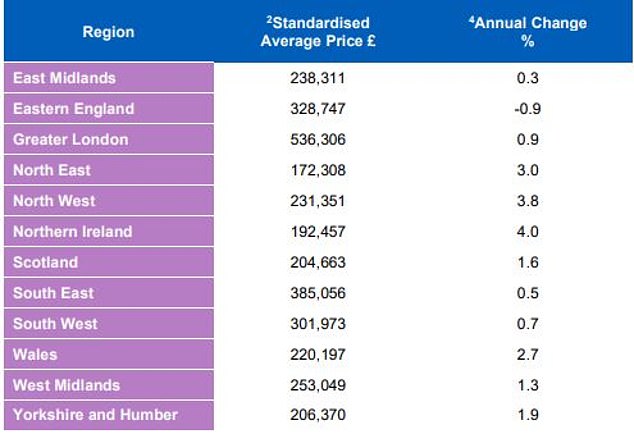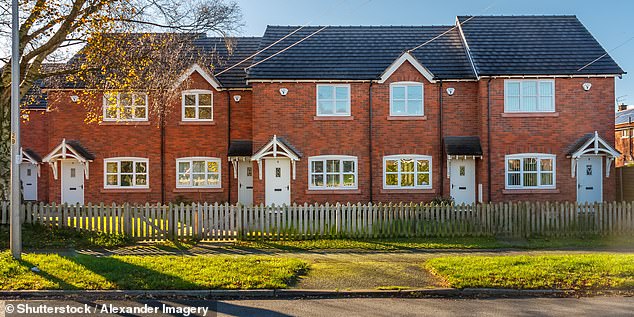House prices rose slightly in the year to June, according to Halifax, which said a lack of homes for sale was supporting the market.
House prices rose 1.6 per cent year-on-year, with the average home value at £288,455. This is the same level of annual growth as last month.
The price of a typical home fell by 0.2 per cent in June, although this is equivalent to less than £500.
Halifax mortgage director Amanda Bryden said higher mortgage rates continue to keep a lid on prices and activity.
Slight increase: House prices have risen slightly over the past year according to Halifax
“This continued stability in home prices reflects a market that remains subdued, although overall activity has been picking up,” Bryden said.
‘For now, it is the scarcity of available properties, rather than buyer demand, that continues to support higher prices.
‘Mortgage affordability remains the biggest challenge facing both home buyers and those ending their fixed-term contracts.
“This problem is likely to be resolved gradually, through a combination of lower interest rates, rising incomes and more moderate growth in house prices.”
What’s happening in the UK?
According to Halifax, prices are rising faster in some regions of the UK than in others, with the most affordable areas of the country tending to see greater growth than the most expensive ones.
Prices in Northern Ireland have risen by 4 per cent compared to last year, while in the North West of England average prices have risen by 3.8 per cent.
In Scotland, the average house price now costs £204,663, up 1.6% on last year. In Wales, the price of a typical house has risen by 2.7% year-on-year and is now worth £220,197.
However, in the East of England, where the average home value is £328,747, prices are down 0.9 per cent compared with June 2023.

What does a Labour government mean for house prices?
The Labour Party has won a large majority and has major plans for housing construction.
Sir Keir Starmer’s government has said it will build 1.5 million new homes in its first term and has pledged to keep mortgage rates low and help first-time buyers.
Anthony Codling, head of equity research for housebuilding and building materials in Europe at RBC Capital Markets, said: ‘If election promises are anything to go by, today is more than just a new day in housebuilding, it’s the dawn of a new era.
‘In the next 100 days we are likely to see a reset of housing targets, a refinement of the green belt and planning reform, and by the end of the year the latest version of Labour may have announced a new generation of new towns.
‘In recent years the potential of homebuilders has been limited, but in the coming years this potential is likely to be unleashed.’
While Labour’s policies may lead to more homes being built, the future of interest rates is likely to have a much bigger influence on house prices than its policies.
Right now, higher mortgage rates are squeezing the budgets of many homebuyers and deterring people from moving.
Andrew Montlake, chief executive of mortgage brokerage Coreco, told news agency Newspage: “The housing market has proven to be more resilient than many expected. Lack of supply has definitely played a part in that.”
‘Mortgage affordability remains a challenge, but the steady stream of rate cuts from lenders this week alone is making things slightly better on that front.
‘Labour’s decisive victory last night and the fact that the election is now over could lead to a rebound in demand for property.
“If the Bank of England cuts the base rate at its next meeting, sentiment will improve as if a switch had been flicked and that could cause house prices to rise more than modestly.”
Jeremy Leaf, a north London estate agent and former chairman of Rics Residential, added: ‘The election definitely added to the jitters in the housing market, but slower-than-expected falls in mortgage rates weighed more heavily.
‘We are hearing in our offices and on the ground that most buyers and sellers have suspended their movements, so we expect the resilient recovery of activity to continue.
‘Looking ahead, rising prices mean prices will remain stable and the arrival of a new government will bring certainty.’
Some links in this article may be affiliate links. If you click on them we may earn a small commission. This helps us fund This Is Money and keep it free to use. We do not write articles to promote products. We do not allow any commercial relationships to affect our editorial independence.


